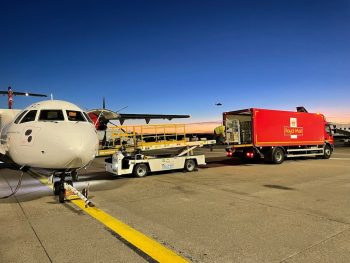Royal Mail is halving the number of domestic flights it operates as the company ramps up road vehicle use to improve reliability for customers and minimise carbon emissions.

The British postal service and courier company is discontinuing 18 domestic flights and increasing its use of vans and HGVs in a major step towards achieving its target of being net zero by 2040.
As well as saving c.30,000 tonnes of carbon dioxide equivalent per year, transporting more mail by road instead of air will improve reliability for customers and help meet growing demand for next-day deliveries, as road vehicles are less likely to be delayed by bad weather. Royal Mail added that its road fleets are less capacity-constrained, enabling it to transport more during busy periods.
The first wave of 11 flights made their final journeys in June, with an additional three flights stopping on 20 July and a further four early next year. The only domestic flights being kept are deemed essential for Royal Mail to fulfil its Universal Service Obligation to provide a next-day delivery service to all 32 million addresses in the UK.
Royal Mail has pledged to reduce its Scope 3 carbon emissions by 25 per cent by 2030 as part of its commitment to reach Net-Zero by 2040. The discontinuation of 18 domestic flights is the most significant step yet in achieving this goal, projected to contribute a 4% reduction in total Scope 3 emissions based on a 2020-21 baseline.
Royal Mail’s HGV fleet is partly run on hydrotreated vegetable oil (HVO), a renewable alternative to diesel that reduces up to 90% of direct greenhouse gas emissions compared to diesel.
The company also has around 5,000 electric vans in operation, said to be the UK’s largest EV delivery fleet.
The capability to divert mail from air to road has been unlocked by changes Royal Mail has made to its operation, including later start times at delivery offices across the country, making it possible to accommodate longer journey times.
Alistair Cochrane, chief operating officer at Royal Mail, said: “The removal of half of our domestic flights is our biggest step yet in reducing our use of air to transport mail and a major step towards our net zero by 2040 target. Not only will this reduce carbon emissions, transporting more mail by road will also help us provide a more reliable service for customers and increase our capacity to meet the increasing demand for next day parcel deliveries.
“Moving letters and parcel by air has played a significant role in Royal Mail’s history, enabling us to fulfil our commitment to provide a next day delivery service to every address in the UK. However, we are continually modernising and these changes to our network mean that we can reduce our reliance on air which is good for our customers and the environment.”

